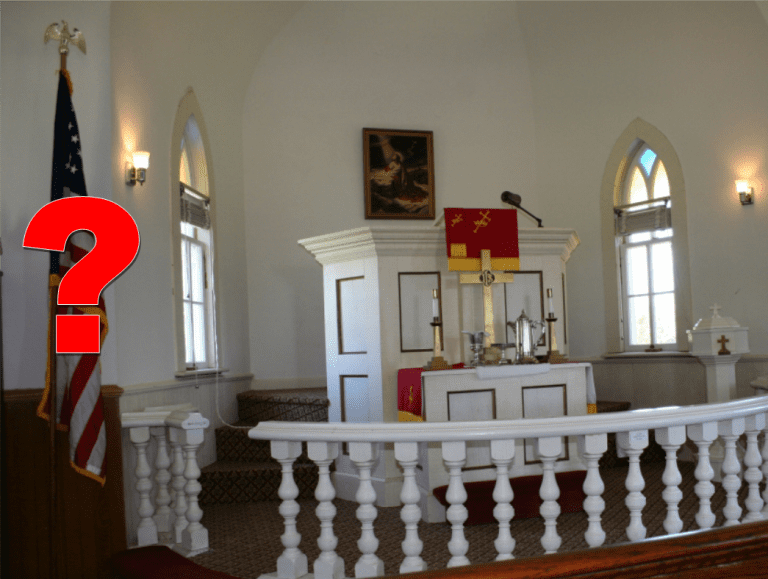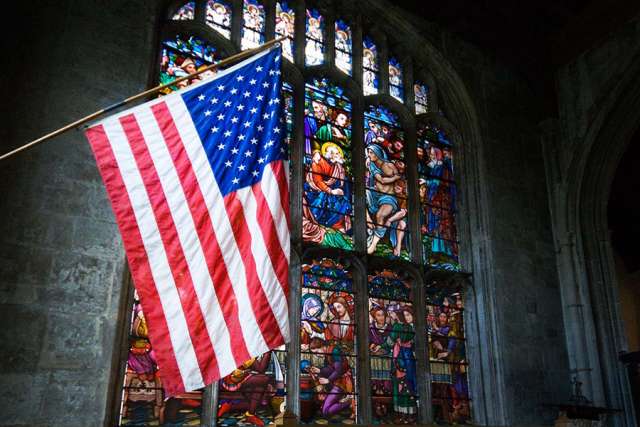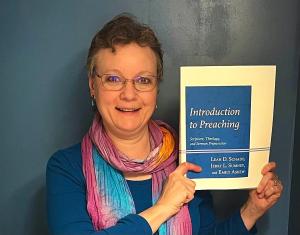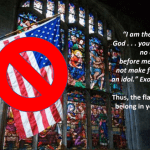Preaching around patriotic holidays is a difficult challenge. “Flagging the Flag — Idolatry and Freedom” is one example of how to confront Christian Nationalism in a sermon.

Flag Day and Independence Day blur the lines between patriotism and nationalist idolatry.
This is part one in a four-part series on sermons for countering Christian Nationalism during patriotic holidays. (See below for links to parts 2, 3, and 4).
This first sermon trajectory is an excerpt from Chapter 21 of the preaching textbook, Introduction to Preaching: Scripture, Theology, and Sermon Preparation, which I co-wrote with Jerry Sumney and Emily Askew.
Introduction to Preaching uses a method of sermon preparation I developed called the Central Question, Central Claim, and Central Purpose. You’ll see how to use this process with the sermon trajectory, “Flagging the Flag: Idolatry and Freedom.” This trajectory utilizes a sermon form called Four Pages which was developed by Paul Scott Wilson. The four “pages” (“movements”) are “trouble in the world,” “trouble in the text,” “grace in the text,” and “grace in the world.” (The order of the movements can vary depending on the sermon.)
Exodus 20:1-6
Then God spoke all these words:
2I am the Lord your God, who brought you out of the land of Egypt, out of the house of slavery; 3you shall have no other gods before me.
4You shall not make for yourself an idol, whether in the form of anything that is in heaven above, or that is on the earth beneath, or that is in the water under the earth. 5You shall not bow down to them or worship them; for I the Lord your God am a jealous God, punishing children for the iniquity of parents, to the third and the fourth generation of those who reject me, 6but showing steadfast love to the thousandth generation of those who love me and keep my commandments.
Central Statements for Exodus 20:1-6
Exodus 20:1-6 is the first part of what many call the Ten Commandments. These verses contain the command to worship only God and to reject graven images of idolatry. In Chapter 15 our theological claim based on this passage was:
God has claimed the Israelites as God’s own and liberated them from slavery, so that the worship of other gods is both unnecessary and blasphemous.
Preaching context
The context we imagined for this sermon is a church where the American flag is in the chancel area of the sanctuary, clearly visible. The preacher wants to craft a sermon raising questions about what the congregation truly worships and whether the nation’s flag in this sacred space is a form of idolatry that needs to be addressed.
The preacher knows that some in the congregation may be open to this conversation; however, there are others who would think it unpatriotic and disrespectful to veterans if the flag was removed from the sanctuary.

So, after exegeting both the biblical text and the church’s context, our Central Question was this.
What does it mean to worship the God of Israel in a culture that deifies its national identity, and how will the church witness to the God of liberation in this community?
This led us to craft the following Central Claim.
Because the God of Israel commanded believers to have no other gods, our congregation must engage in a serious discussion about the appropriateness of having the American flag, an engraved image of nationalism, within our worship space.
When it came time to write the Central Purpose, we drafted three possibilities, each with a different tone, emphasis, and expectation for the congregation.
- The Central Purpose of this sermon is to compel the congregation to confront nationalism, name it as idolatry, and worship only the God of liberation.
- This sermon will challenge listeners to question their loyalties to those things that are not of God, including nationalism and the display of the American flag in the church sanctuary, so that we can worship the true God of freedom.
- This sermon initiates a conversation about what it means to worship the God of Israel so that we can speak honestly about fulfilling the commandment not to worship other gods.
In this sermon series on countering Christian Nationalism, you’ll see how each of these Central Purpose options can inform a sermon depending on what the preacher wants to accomplish.
Sermon Structure for Exodus 20:1-6 Using Four Pages
Using the work we have done so far on Exodus 20:1-6, we could craft a sermon addressing the idolatry of the American flag in the worship space by following Wilson’s Four Pages. In this sermon, the Central Purpose we’ll use is #2: This sermon will challenge listeners to question their loyalties to those things that are not of God, including nationalism and the display of the American flag in the church sanctuary, so that we can worship the true God of freedom.
Note that this is not a full sermon but a description of the sermon trajectory.
“Flagging the Flag – Idolatry and Freedom”
Page One – Trouble in the text
God liberated the Israelites and gave them the command to have no other gods and no graven images. But we might not realize why this command was necessary. What led to this point on the mountain where Moses received this commandment from God? We have to look at the scriptural background on two levels.
On its face, the story is about when the Israelites were slaves in Egypt. But the original hearers of the story were exiles in the Babylonian Captivity hundreds of year later. In the narrative, enslaving the Israelites was made possible because of a theological heresy claiming that Pharaoh is a god whom they must obey and worship. This idolatry was symbolized by the graven images of multiple deities such as the sun, frogs, water, insects, and the Nile River, all of which were believed to be under Pharaoh’s control.
Page Two – Trouble in the world
Nations today continue to make images that symbolize their omnipotence, ubiquity, and omnipresence – all divine qualities.
When a nation’s flag is placed anywhere in the world (or even on the moon!), it is making a claim that this nation has sovereignty, control, and exercises ultimate power. When that nation’s flag is placed in a church, there is a complex array of both subtle and explicit meanings that could be quite problematic. At the very least, it raises questions about the appropriateness of graven imagery in the worship space.
Page Three – Grace in the text
In the book of Exodus, God revealed the fallacy of Pharaoh’s claims to divinity and established that the true God is one of liberation and freedom for the oppressed and enslaved.
God did this first through the ten plagues, each of which affected one of the smaller deities of Egypt and showed Pharaoh to be powerless over them. Then God freed the people. And with that freedom came the responsibility to make sure future generations did not make the same mistakes as their Egyptian oppressors. So, God gave them the command to have no other gods and no graven images.
The good news is that no other deities are necessary, and they are free from this idolatry that had exploited them.
Page Four – Grace in the world
Today, God is still sovereign and requires believers to forego any graven images, lest they unknowingly (or knowingly) worship an idol.
The church can be free from any symbols of nationalism, any advertising, and any images that compete with our loyalties and our worship of the one, true God. This allows us to be truly liberated to serve God and neighbor.

More information about countering Christian Nationalism
Faithful America has launched a sermon and prayer drive for Sunday, June 11, 2023 — the week of Flag Day — to bear witness for peace and love against Christian Nationalism.
They have put together a very helpful collection of preaching resources and sample prayers as part of a toolkit to equip clergy and congregations to counter the toxic effects of Christian Nationalism. These resources work well in the lead up to June 14, Flag Day, as well as July 2 for the week of Independence Day. To access the toolkit, sign up here.

Faithful America is a Christian organization working to provide a Christian counter-witness to Christian nationalism as well as take on the religious right from within its own religion. To find out more, visit: https://www.faithfulamerica.org/.
The series exploring flag placement in the church through preaching continues:
U.S. Flag in the Church? Preaching on Patriotic Holidays
This Flag Has Legs: A Sermon Inviting Dialogue about Flag Placement in Church
The Big Red, White, and Blue in the Room: A Sermon about Deliberating the Flag in Church
Read also:
Flag Placement in Church: How to Have the Conversation
It’s Okay to Be A Progressive Christian. Here’s Why.
Countering the Temptations of Christian Nationalism: Matthew 4:1-11

The Rev. Dr. Leah D. Schade is the Associate Professor of Preaching and Worship at Lexington Theological Seminary in Kentucky and ordained in the ELCA. Dr. Schade does not speak for LTS or the ELCA; her opinions are her own. She is the author of Preaching in the Purple Zone: Ministry in the Red-Blue Divide (Rowman & Littlefield, 2019) and Creation-Crisis Preaching: Ecology, Theology, and the Pulpit (Chalice Press, 2015). She is the co-editor of Rooted and Rising: Voices of Courage in a Time of Climate Crisis (Rowman & Littlefield, 2019). Her newest book is Introduction to Preaching: Scripture, Theology, and Sermon Preparation, co-authored with Jerry L. Sumney and Emily Askew (Rowman & Littlefield, 2023).













